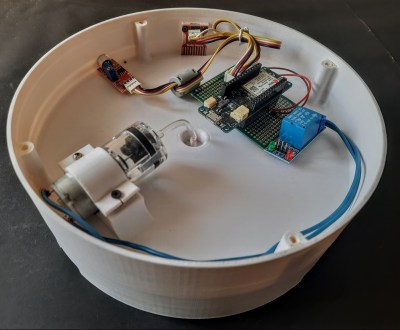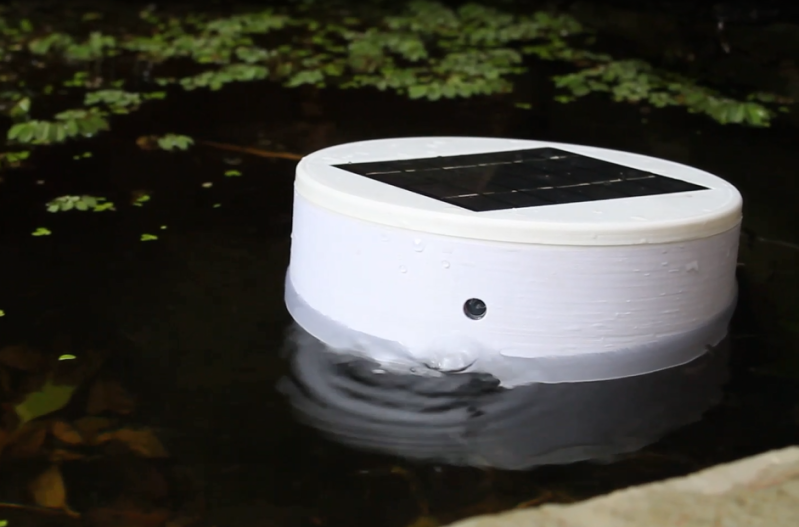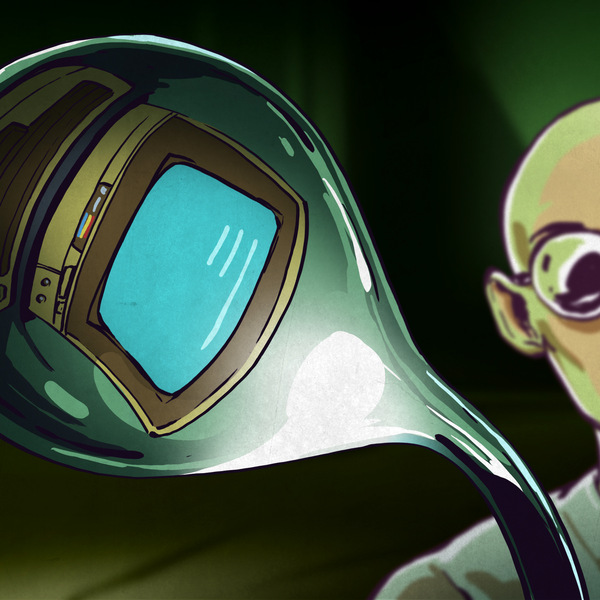Mosquito haters of the world, rejoice! A few years ago we told you about the first version of this solar-powered mosquito repellent that works by disturbing the surface of standing water. Since then, the project has received worldwide attention, and [Pranav] is back with Solar Scare Mosquito version 2.0 in time for the the 2020 Hackaday Prize.
 The idea’s still the same as before: let mosquitoes lay their eggs in the standing waters of tanks and swamps, then disturb the water with vibrations so the larvae on the surface can’t breathe.
The idea’s still the same as before: let mosquitoes lay their eggs in the standing waters of tanks and swamps, then disturb the water with vibrations so the larvae on the surface can’t breathe.
As smart as this simple idea is, version 2.0 is even smarter. It has a microphone that listens to the wing-beat frequencies of mosquitoes that like to hang around places like that.
Inside there’s an Arduino MKR GSM to run the ripple-generating air pump, detect water from the sensor, and gather data from the microphone.
With a network of these devices all reporting data, [Pranav] envisions an early warning system for mosquito-borne epidemics that works by alerting the locals through their phones.
Solar Scare Mosquito has come a long way since 2014. Check out the video after the break.




















Question is if it has any unexpected side effects to it.
Might toss other insects under the bus so to say.
Though, an over abundance of mosquitoes in urban environments isn’t particularly useful, and there typically isn’t all that many other insects in such environments either, so it shouldn’t do much harm.
In the end, a simple solution to a rather huge problem.
I seem to remember reading somewhere that mosquitos have been pretty deeply looked into to identify their contribution to the life cycle of other species. The conclusion is often nothing or next to nothing. Most seem to conclude that if they went exinct tomorrow the world would largely be better for it. The only reason we haven’t purged them all is a lack of an ability to do so without killing other things we do actually want alive.
All that said I could be totally wrong and they secretly are the life blood of some super important thing.
Indeed, while they are eaten by some bird/bat etc they are not a known common part of the diet for anything. So you could almost consider them apex predators. And the apex predator is rarely missed in the rest of the food chain if it goes missing – something else will come to balance the now less predated prey animal(s).
So the only downside to this device is if it reduces numbers on a different but vital other critter of some sort – most likely amphibian or insect with larva.. So deploying it to the urban a lakes and such should be ok but wide deployment without that question answered can’t be accepted – could end up killing off almost all the birds for example – as the little birds that go for insects on the wing are often prey for larger birds. The fact it now detects their wingbeat frequency should reduce the harm it can do to other species, but it does need study.
I thought dragonflies eat primarily mosquitoes.
Correct. Dragon flies also perform the same physical action of disturbing small puddles of water. They will hover over and around a pool of still water endlessly looking for food and mates.
We had zero dragonflies when we moved in. Made the frog pond, now we have dragonflies galore, as well as a plethora of other beneficial wildlife. But nary a mosquito in sight. I rarely get bit, and it is rainy season here, when they normally come out in DROVES. I literally couldn’t walk out back when we moved in, now I can be outside during the worst times of the day without issue.
I stand corrected. Dragonflies are far cooler than this device, pretty and astonishingly agile.
I wonder if how universal that is, could it be certain species only, as I’d never heard of anything that predates the annoying buggers – I’d guess round here with less mosquitoes than many places anyway its possible it doesn’t get mentioned – eating butterflies, flies and other dragonflies is all I’d heard about.
Apex predators play a huge role in ecosystem balance, something we in the US recently saw happen with the removal and then reintroduction of wolves in Yellowstone Park. Removing the apex predator in that environment had disastrous consequences which have been reversed since bringing them back.
Fortunately, mosquitoes aren’t apex predators and so the same math won’t apply.
Here’s the good news: there are over 3000 species of mosquitto in the world, and only a couple dozen of those feed on humans. Through genetic engineering we have several means at our disposal to wipe those species out that are highly selective and would not impact other mosquito species, let alone other non-mosquito insects.
What we are lacking is the will. Once the word “GMO” is brought up everyone loses their minds. For every year we let those people stop this from happening, another million people will die of illness brought to them by mosquito. This hand-wringing is killing humans by the millions, and yet we continue to wait to use the tools we have which would end our mosquito problem and save the next million human lives.
If you remove all the top predators you do get trouble. But removing one predator of many that isn’t often or ever prey itself the system balances out again. OR you do like many nations have done – manage the prey animals themselves – which if you do it right works out well for everyone – can have ‘wild’ areas and food all at once.
I think the issues people have with GMO is the justifiable fear that used badly it could spread unexpectedly, thus causing unpredictable and significant harm.. Got nothing against it done right, but any time you start playing god with nature you have to take it slow and do the lab and impact study work. The getting the political types to look at the real world over press buzz words and backdoor payoffs with the legislative stuff however…
your correlation to a mosquito as an ‘apex predator’ is a misnomer of sorts. The logic behind apex predators is more about how they influence the movement and habits of herds of prey animals. Mosquitoes do no such thing.
and yes, everything eat mosquitoes and their larvae. Primarily amphibians, which are a crucial, and often overlooked, part of our ecosystems. See the other posts I have made here for more information.
Removing mosquitos from some ecosystems will have a direct impact on some fish species.
Some species of fish rely completely on the annual protein boost they get from mosquitos and their larva in order to reproduce.
This is very obvious in many places where a fish species called Gambusia have been released by humans. Gambusia have been intentionally introduced to lakes rivers and streams to deal with mosquito populations. They are remarkably effective breeders and feeders and out compete native species for food. They are able to make such an impact to mosquito populations in some environments that native species collapse either due to disruption of the reproductive cycle or starvation.
Interesting never heard of anything that really relies on ’em, not sure your example proves anything though – if they are outcompeting the local population it could be for any number of reasons. Just because they were put there to deal with mozzis doesn’t mean they don’t eat all the amphibian spawn, plant life etc the local fish prefer, or by their rapid breeding and growth etc change the water conditions unfavourably – You might well be right.. But invasive species is always more complex.
I always hear people say this part, but never have seen any kind of the actual deep study we’re always talking about. My guess? Humans are involved, it will be entirely shortsighted and wrong and get fucked cataclysmically in the end, leading to great immiseration somehow or another.
It’s more a testament to how much people hate mosquitoes than our wisdom that we’re willing to think for a second that we can be ecological about intentionally exterminating an incredibly common species.
They are a significant source of food for dragonflies both in the larval and adult stages of I remember correctly.
A few years ago there was some hurricane / flood which submerged some big populated area, which became mostly abandoned after that, and all the old ponds and swimming pools became breeding grounds for mosquitos.
Then some smart guy came with the idea to put some fish in all those abandoned swimming pools. No batteries needed.
That is definitely a great idea for any body of water that is both large and stable enough to support fish. It doesn’t work so well with all the seasonal and short term puddles. Any water that lasts a couple weeks or more will do for mosquitoes.
Besides, those bodies of water which can host fish will whether you stock them or not. I’ve seen it happen where quaries are dug down below the water level and then some months later the new pond has fish with no connection to any existing lakes or rivers. Birds carry the fish eggs on their feet. Stocking them might help speed up the mosquito relief but it was coming anyway.
I have a brother who is a mosquito control agent. They use huge quantities of gambusia every year. Where they won’t work they spray and in small isolated bodies of water like cattle troughs and cisterns they use a little mineral oil. You can also use a few drops of detergent or wetting agent like Photoflow of Jetdry. Either way prevents them from getting air. https://en.wikipedia.org/wiki/Mosquitofish
If this thing really works and with solar, it will be effective a lot longer than treatments I would think. We really just need little nano-Benders who hate mosquitos. What could go wrong?
Frogs. Reproduce faster, and they breed on a similar cycle to the mosquitoes. People forget that amphibians play a very large role in our food chain and ecosystems. This is also a good reason to NEVER use anti-bacterial soap, eg: triclosan, because it kills amphibians when introduced into our water systems. Thus destroying the animals that eat mosquitoes on a massive scale. An ecosystem of frogs can survive unaided in water uninhabitable by many fish, and the tadpoles literally live right in the water with them. Then when they grow legs, they clean up all the other areas where mosquitoes might exist.
Sounds like New Orleans.
I used to live on a small (8 sq mile) Caribbean island, without central water.
We used cisterns that collect rainwater from the roof.
Some people had guppies in their cisterns to keep mosquito larvae in check.
Other people just screened off the cistern.
If the device doesn’t kill all of the larvae, it will likely just result in “wave resistant” larvae.
I thought a tapper( balanced arm taps water on one side then rocks to tap the other ) was one of the least energy consuming water surface exciters around. I will have to look at how the air pump works and the energy required.
Some have used solar powered water pumps to add both visual effects and water rippling but water pumping takes larger solar panels so not as inexpensive. The tapper takes very little energy because it is balanced and just needs to be rocked a short distance after overcoming surface tension.
Simple as that, huh? lol
Not really, but not needing blood would give the modified bugs a competitive advantage, but I’m just spitballing. Remember the only bad idea is the one not articulated.
Well, mosquito condoms would be just fine, but what is described here isn’t mosquito birth control; it’s mosquito ABORTION!
Nature has LITERALLY already solved this problem.
The applications of such a device should/would be VERY limited. Most of the time, in my experience, it’s MUCH EASIER just to modify the point of standing water. This usually comes in the form of crap laying around your yard, or a pot that won’t drain properly, or some other man-made point of standing water. Most of these are small, insignificant to most, but a breeding ground for mosquitoes.
The REAL solution? it’s counter intuitive, but here it goes…. a more massive puddle of standing water.
How it works: Tadpoles. If you have a large enough, deep enough pool of water full of algae, frogs will show up in droves. No more Mosquitoes. it also attracts dragonflies, and other biological mosquito destruction machines. The more of those you attract the more bats show up, yet another eater of mosquitoes. I literally have countless biological mosquito destruction machines in my back yard, because I have a frog pond. Also get some beautiful and presumably endangered birds that show up to eat the tadpoles and frogs which is great fun for kids to learn.
there is no better engineer than nature. Observe and facilitate.
For those of you that don’t know, often times creeping/climbing vine types of plants will enable mosquitoes to reproduce on a massive scale. You know, that pretty stuff people like to have grow on their fences, then they spray bomb, screwing up the ecosystem and killing all the birds like idiots.
The best part of this method is that it’s usually cheap/free. my frog pond is roughly 10k gallons, or the size of a small swimming pool. I would do some research on what types of frogs live in your area and how much thermal mass you have to have in order to keep them alive. I would assume that the mass should be buried in the earth in colder climates.
Chickens can be useful too, if you can have them. Chickens are VERY good at removing leaves and small brush from corners of your yard and generally causing mayhem to any form of water or item that holds water in your back yard. They’ll also eat baby snakes, small mice, grubs that kill your plants, etc. Basically they eat EVERYTHING, shred leaves, and distribute it back into the soil as nitrogen. The frogs will be a great meal for them when they try to escape the pond. :-D
Even just a few weeks of having chickens improves overall yard health drastically.
FWIW: the dragonflies almost never leave the water still. They are always buzzing it and dunking their bums in it.
Point is, if you take care of your backyard ecosystem, mosquitoes WILL NOT be a problem. You have to fight that urban sprawl and literally get in touch with nature where you live. Gardening is a great way to start. Create a food forest in your back yard and find plants and natural mechanisms that compliment your life, rather than destroy it. All of these methods also have the ‘side-benefit’ of sequestering massive amounts of carbon, rather than releasing them with your lawn mower and your pointlessly ultra-manicured lawn.
Nobody wants to mow a lawn anyway, so why not turn it into food?
If “nature has already solved this problem”, a) why do we still have mosquitoes, and b) how did mosquitoes thrive before people littered the planet with small, shallow pools of water?
Read the part about how humans demolish and neglect ecosystems. It is OUR JOB to be good stewards of our planet. ie: IF YOU DON’T WANT MOSQUITOES, then stop bombing with insecticides that don’t work and make the problem worse by removing the predators. As a primate with a higher brain function and access to the internet, you can easily identify breeding grounds for mosquitoes and try to eliminate or negate as many as possible, and FACILITATE the predators that eat mosquitoes.
I honestly think you didn’t read anything posted above. Because it’s literally all there. Your question is literally a troll question.
I’ll answer anyway: we still have mosquitoes because they are part of the food chain and it is very difficult to completely eradicate smaller, more simple organisms, where as it is the opposite for land dwelling complex creatures. Not my opinion, it’s hard science. Archaeology has taught us as much and the ‘war on microbes’ we started with anti-biotics has proven as much in real time.
It’s really not a debate, it’s just how ecosystems work.
Mosquitoes have survived since the age of dinosaurs… trough multiple cataclysms… Good luck trying to eliminate them entirely, it will never work. So increase those that feed on them, and they will be eaten nearly as soon as they start flying, or before they do.
Okay, so nature doesn’t see any problem with mosquitoes, or nature WOULD have solved it. So don’t tell me nature has solved the problem. And if it’s not open to debate, then I won’t bather arguing any of your points. You said nature has already solved this, and then basically said that they have survived for millions of years. So what, exactly, has nature solved?
I don’t think the frog person was claiming that nature would wipe out mosquitoes, but that a healthy ecosystem would keep their numbers in check through predation. Human-dominated ecosystems remove this predation (e.g by poisoning frogs with antibacterials or dragonflies with broad spectrum insecticides) which allows the mosquitoes to reach plague levels. Then the himans panic, spread more poison amd the cycle continues.